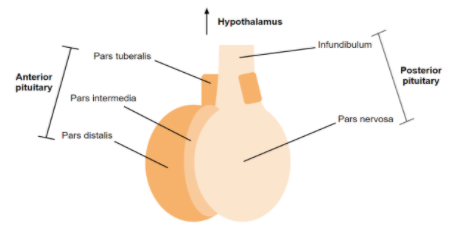Question
Question: Name the hormones secreted by pituitary glands in humans....
Name the hormones secreted by pituitary glands in humans.
Solution
The Pituitary gland is known as the 'master gland' as the hormones it produces control so a wide range of cycles in the body. It detects the body's needs and imparts signs to various organs and organs all through the body to control functions and regulate a suitable environment.
Complete answer:
The pituitary gland is a pea-sized endocrine organ, arranged in the skull base and kept secured inside a hard hole called the Sella turcica. It assumes a basic part in managing the elements of different other endocrine organs and keeping up generally speaking hormone levels in the blood. The pituitary gland is divided into two sections: anterior pituitary gland and posterior pituitary gland. The gland is associated with another cerebrum structure called the nerve center by a tail involving veins and nerve strands. The front flap is fundamentally made out of hormone-emitting epithelial cells, though the back projection contains unmyelinated nerve strands originating from the nerve center.
Heavily influenced by the nerve center, the pituitary organ controls the autonomic sensory system, which assumes a fundamental part in managing different automatic elements of the body, including internal heat level, yearning and thirst, pee, heartbeat, and rest. The hormones emitted by the pituitary organ are imperative controllers of a large portion of the other endocrine organs. Furthermore, a few hormones legitimately control the capacity of explicit organs.
The hormones emitted by the pituitary gland assume a pivotal part in the guideline of significant physiological capacities.
Thyroid-animating hormone (TSH) – A glycoprotein that invigorates the creation and emission of thyroid hormones (T3 and T4) by the thyroid gland. The thyroid hormones assume an indispensable function in managing digestion, energy homeostasis, development, and sensory system exercises.
Adrenocorticotropic hormone (ACTH) – Invigorates the Adrenal gland to deliver pressure hormones, particularly cortisol. Under unpleasant conditions, cortisol is delivered in high sums in the blood and controls the body's response to stretch. Specifically, cortisol builds glucose digestion, controls pulse, and decreases irritation. Likewise, cortisol assumes a focal function in battle or flight reaction, which is a versatile reaction of the body to apparent dangers.
Follicle-invigorating hormone (FSH) and luteinizing hormones (LH) – These hormones are all known as gonadotropins, which animate the ovary to deliver estrogen and progesterone and the testicles to deliver testosterone. Both LH and FSH assume significant functions in controlling the development and development of sperm and egg cells. Strange creation of these hormones causes period related issues, sexual breakdown, and fruitlessness.
Development hormone (GH) – This hormone invigorates development in children and partakes in keeping up different body tissues/organs in grown-ups, including bones, liver, and fat and muscle tissues. In grown-ups, the overproduction of GH causes acromegaly, which is described by expanded bone size. In children, an excessive amount of GH causes gigantism, a state of anomalous development.
Prolactin – This hormone animates the mammary organs to create milk after labor. A high prolactin level can influence the elements of ovary and testicles.
Antidiuretic hormone (ADH) – This hormone is otherwise called vasopressin. It controls water maintenance by the kidney and directs liquid parity and mineral focus in the body. It additionally causes tightening of the veins. A low ADH level can build pee and trigger a parched inclination. This condition is known as diabetes insipidus.
Oxytocin – This hormone invigorates uterine withdrawal, which is basic during the conveyance of an infant. It additionally invigorates milk emission during breastfeeding.
Aside from the front and back projections, the moderate part that associates the two flaps secretes melanocyte-invigorating hormone, which animates melanin creation in the skin. It additionally directs hunger and sex drive.
Note: Pituitary problems may prompt less or excessive secretion of hormones in the body which can be the reasons for Adrenal inadequacy, Endocrine framework disorder, Addison malady, Cushing condition, Thyroid infection.

